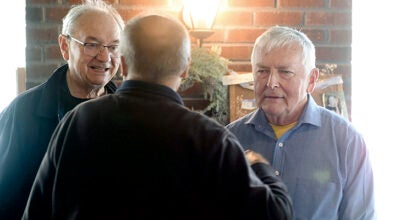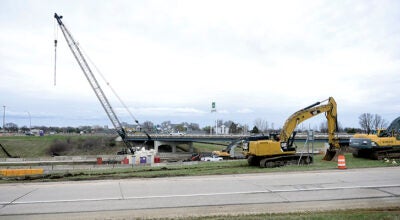Unity of understanding: Statement seeks harmony between community, law enforcement
Published 7:01 am Saturday, December 19, 2020

- Jeff Ettinger (Hormel Foundation, Karem Salas Ramierz (United Way of Mower County), Bonnie Rietz (Hormel Foundation) and Herve Idjidina (Welcome Center) helped organize the Community Understanding Statement. Eric Johnson/photodesk@austindailyherald.com
|
Getting your Trinity Audio player ready...
|
In the wake of the George Floyd killing, communities throughout Minnesota started looking inward toward their own as the following protests swept violently through Minneapolis.
Protests fanned out from Minneapolis, sometimes peaceful and sometimes violent, but in Austin there was a proactive approach that sought to put the community ahead: A statement that struck a balance between all facets of the community that sought understanding.
The Austin Community Understanding, endorsed by both the Austin City Council and Mower County Board of Commissioners, is the center of that understanding, introducing five principles that act almost as a guide.
• Support for the right of peaceful assembly and protest within the community;
• Support for the protection of community members, businesses, buildings and institutions from violence, rioting or looting;
•The expectation that interactions between community members and law enforcement be mutually respectful and free from bias;
• The expectation that only trained, licensed local law enforcement agents should be actively engaged in maintaining public safety and protecting property in public spaces; and
• The expectation that local government and law enforcement will actively support and engage in the protection and enforcement of the above.
“(We wanted to) get ahead of these challenges that occurred in Minneapolis,” said Hormel Foundation Executive Director Jeff Ettinger. “If we have a chance to think through these issues ahead of time and get broad community representation, we’ll be better off.”
The root of the statements starts with The Hormel Foundation, which hosted a listening session of about 30 people.
The session asked two questions: “What has been your experience with law enforcement and are there any improvements we can make?” and “Do you feel Austin is a welcoming community and what can we do to be more accommodating?”
“The community participants covered a lot of ideas in the community, some that are being followed up on,” Ettinger said.
A partner in the effort and a natural fit was the Welcome Center. Established in 2000, the purpose of the Welcome Center was to help those coming to the community from other nations.
Executive Director Herve Idjidina saw the listening session and the ensuing Community Statement as a chance to bring two worlds together.
“First of all, it was an opportunity both for community members and The Hormel Foundation to hear what was going on, the challenges that people are facing, and it was a great opportunity for the community members to express themselves about what is going on and what are the expectations,” Idjidina said.
It’s a further sign of how ready and able the community of Austin is in accepting those of diverse backgrounds.
Karem Salas Ramirez, community impact coordinator for the United Way of Mower County, was one of those that took part in the initial listening session. She came away feeling hopeful about the future of Austin.
“I’m so grateful that our community comes together to talk about this,” Ramirez said. “We live in a progressive town. Our community is in a place that can come together and discuss how it is your feeling and how we can improve.”
Of course, this statement means that much more when both of the local governments and local law enforcement are on board.
Hormel Foundation Vice Chair Bonnie Rietz said the action by the Austin City Council and Mower County Board were affirmations of the effort to connect resources and commitments within the community. Both Austin and Mower County voted unanimously to support the statement.
“We can be really thankful for that openly strong support,” Rietz said. “We’re very blessed in this community.”
Law enforcement
After the killing of Floyd, law enforcement was branded with a bullseye. The fate of those Minneapolis officers accused of the crime, including former police officer Derek Chauvin, are still to be decided, but in the court of public opinion, many had already made up their mind.
Calls for defunding police and even finding alternatives to policing sent ripples through the law enforcement world.
In Austin however, law enforcement has taken an active approach toward innovative policing that recognizes not only the community as a whole, but those diverse portions of the community.
Like the community as a whole, the Austin Police Department and Mower County Sheriff’s Department have stepped forward in not just welcoming those of diverse backgrounds, but actively trying to inform them as well.
It’s a balance of safety.
“We’ve been fortunate that our city leadership — both elected officials and leaders throughout other places in the community have championed diversity,” said APD Chief David McKichan. “Those are places that experience growth. I think Austin has grown in years and bucked the trend not to grow because we have been open to diversity and welcoming new ideas.”
In Austin this summer, there were two protests of the Floyd killing and both were held lawfully. Law enforcement is committed to making sure the right to protest is protected while at the same time maintaining the peace.
“For the most part, we are here to not only handle ensuring the safety of those that are respective and professional, but ultimately allows the community to feel safe,” McKichan said. “We want to serve all that we encounter.
Mower County Sheriff Steve Sandvik is of the same opinion. It is a stance the Mower County Sheriff’s Department has been actively embracing for years now, going back to when Terese Amazi was sheriff.
It’s a base that makes the Austin Community Understanding initiative that much stronger.
“It’s extremely important,” Sandvik said. “I think the primary thing I would point out when you look at the statement, our primary whole is the enforcement of laws and dispatching of emergency services. The benefit we have in our community, with our local law enforcement is that we’ve been doing it for 20 years. We watch for bias and train for bias.”
And that central theme is what centers the entire community of Austin: To maintain a level of fairness so that all sides feel safe and are made strong when government bodies voice support.
“It gave the message an important weight,” Idjidina said. “This is very important for the immigrant community. We trust our leaders in power when they value this and take it seriously.”





